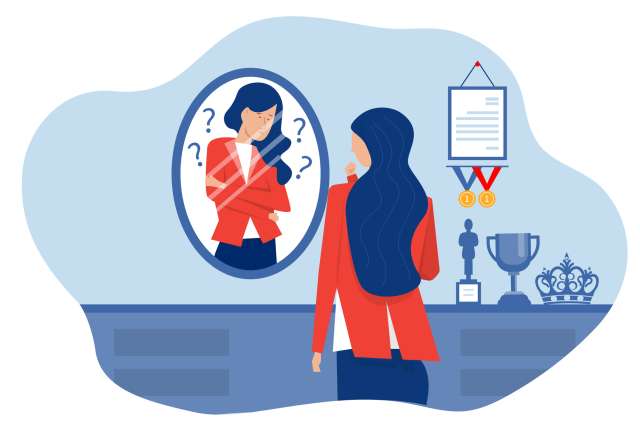If you’ve ever been a new student at a prestigious school or a new employee at a coveted job, you may have had the creeping sense that you didn’t really deserve the opportunity; that even though you’d earned the position on your own merit, it would be just a matter of time before people discovered that you’re a fraud.
This feeling is known as imposter syndrome, and it’s common among successful people, particularly those from marginalized groups, says Brandon Ito, MD, MPH, a psychiatrist with UCLA Health.
The term “imposter phenomenon” was coined in 1978 by two clinical psychologists, who noticed that many of their clients — high-achieving women who were graduate students, medical students and working professionals — had “an internal experience of intellectual phoniness” and didn’t feel worthy of their accomplishments.
Imposter syndrome isn’t a mental health diagnosis, but it can be associated with depression, anxiety and other behavioral health concerns.
Who feels like an imposter and why?
The profile of who experiences imposter syndrome has broadened over the years, Dr. Ito says, and the phenomenon is particularly prevalent in medicine and health care.
One study found that as much as 60% of medical students experience imposter syndrome.
“The reason why this is important — not just that it’s a high number — but we know that imposter syndrome directly correlates to later burnout and also worsened mental health,” Dr. Ito says. “Not surprisingly, it’s still broadly higher in females and also broadly higher in minority racial groups that are underrepresented in the medical field.”
Feeling like an imposter isn’t just about being underrepresented, he adds. Structural and systemic factors are also at play.
Poor mentorship, low feelings of belonging, and experiences of racial or gender discrimination, including microaggressions, contribute to feelings of imposterism among minority medical students, a recent study found.
Such microaggressions might include female physicians being mistaken for nurses, questions about people’s ethnic heritage and insinuations about affirmative action affecting admission to medical school. Data also show that people who belong to minority racial groups are less likely to be promoted to leadership roles.
“In a lot of ways, these (biases) then become self-reinforcing,” Dr. Ito says. “Individuals might start to question themselves. They might start to isolate if they don’t feel like they belong. They might undervalue their achievements or may even take on more responsibilities or higher work burdens to quote-unquote prove that they belong. And all that directly relates to burnout.”
It also may ultimately lead to fewer health care workers and leaders of color throughout the workforce, which perpetuates the cycle of underrepresentation.
“Especially in medicine, this is disastrous,” Dr. Ito says, “because we know that diversity in the medical workforce is associated with improved health outcomes, especially for disadvantaged communities.”
Women and members of minority groups aren’t the only people who experience imposter syndrome. But white, male, heterosexual individuals are more likely to find mentors and superiors who look like them and less likely to experience microaggressions and other forms of discrimination.
Overcoming imposter syndrome
People experiencing imposter syndrome can generally recognize it within themselves. However, because structural racism and microaggressions tend to be so pervasive throughout a person’s life, “a lot of the facets of imposter syndrome become internalized by the time they are in medical school or as an adult,” Dr. Ito says.
He recalls experiencing imposter syndrome himself, though his had more to do with his background and being the first in his family to go to medical school.
“One of the first things I observed when I started medical school and looked around (was) a lot of my colleagues had physician parents. That, in itself, immediately brought up this feeling of imposter syndrome, in that I am already behind the ball,” he says. “They’re more advanced. They’re already ahead of me because they’ve grown up in that environment and they’ve been exposed to medicine all their lives.”
Dr. Ito suggests people experiencing imposter feelings recognize what’s happening and acknowledge the interpersonal and structural factors that contribute to the phenomenon.
He advises compiling a list of small accomplishments they’re proud of -- such as passing an exam or connecting with a challenging patient – and relishing those achievements in their own right without considering how they compare with their peers.
If feelings of imposter syndrome are leading to isolation, anxiety and depression that interfere with work, school or life responsibilities, that’s when to reach out for help, Dr. Ito says. Losing enjoyment or interest around studies or work and feeling cynical are also indications that imposter feelings may be causing more serious problems, he says.
It’s important to recognize these signs early rather than push through and hope the feelings will fade, he adds.
Dr. Ito also encourages people experiencing imposter syndrome to give themselves grace and “acknowledge the fact that they're here for a reason.” It’s not just luck or good timing that’s led to success in their field.
“By the time people get to the state of being in medical school here, or being in residency here, or becoming a faculty here,” he says, “there are a lot of steps that would have weeded them out were they not truly competent or deserving of the position.”




